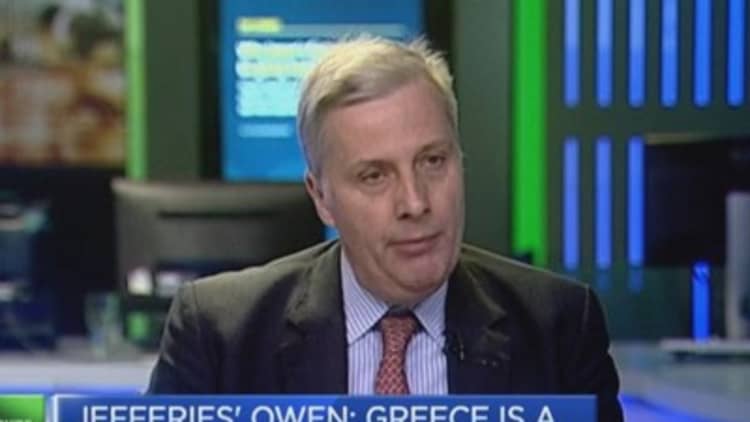
After a weekend of trying to mend fences with its international creditors ahead of a loan repayment due to the International Monetary Fund (IMF), Greece crashed into another row after it put a figure on the war reparations it wants Germany to make.
As the storm clouds gather over Greece in a week some say could be critical for the country's future within the euro zone, or outside it, Greece's appetite for war compensation from Germany remained undiminished.
On Monday, the country's deputy finance minister said Germany owed it nearly 279 billion euros ($302 billion) for the Nazi occupation of the country in World War II, putting a definitive amount on the reparations it has been claiming for decades it is owed.
The latest claim comes is a result of the findings of a parliamentary panel set up by Greek Prime Minister Alexis Tsipras to examine how much the country is owed, including the repayment of an occupation loan the Nazis forced Greece to make. Germany says it has already made compensation payments and owes nothing.
The row has managed to make already frosty relations between Greece and Germany even cooler and analysts question what good can come of the latest controversial claims.
"All of this from the current government is just to show that 'we're here and we're not giving up these claims'," Nick Malkoutzis, deputy editor of Greek newspaper Kathimerini, told CNBC Tuesday. He doubted the strength of Greece's legal position for reparations, however.
Read MoreTensions high asGreece makes WWII payback threats
"Apart from whatever damages that Greece might claim – and, to be honest, I think whatever legal basis for claiming those has now gone -- (but) there was a loan that Greece was forced to pay to the occupying Nazis forces in the second world war that was recorded – and there is a legal issue over that loan but I think that is for a much smaller amount of around 11 billion euros."
Greece's apparent fixation on war damages comes at a time of critical problems for the country, both in terms of economics and politics.
Greece has been the recipient of two international bailouts worth a combined 240 billion euros, and its second bailout program was extended by the IMF, European Commission and European Central Bank, the bodies overseeing its bailout program, in February by four months to give it more time to make drastic reforms in return for a final tranche of aid.
However, both reforms and the 7.9 billion euros worth of aid remain in name only and the country could soon run out of money. Greece has a 450 million euro loan repayment due to the IMF on April 9 and has to cover pension and salary payments this month.
Read MoreGerman couple pay$935 Greece WWII reparations
Finance Minister Yanis Varoufakis has reiterated his country's commitment to its creditors, however, saying on Sunday that Greece "intends to meet all obligations to all its creditors, ad infinitum," Reuters reported Monday. He also told a Greek newspaper Monday that the country "must" reach an outline funding agreement with its lenders at the Eurogroup meeting on April 24.
'Europe's trouble spot'
Christian Schulz, a senior economist at Berenberg, said Tuesday that while the 279 billion euro figure that Greece was claiming in war damages would cover nearly 90 percent of Greece's entire public debt, it would do little to help Greece's current crisis.
"If the government were to support these claims, long legal battles between Germany and Greece might loom, but that would be of little help in the immediate crisis," he said in a note Tuesday. As such, he said, "Europe's trouble spot provides few reasons for optimism, to put it mildly" and that the new threat is snap elections or a referendum as early as May.
"If the T-bill auctions on 8 and 14 April go well and funds also cover pension and salary payments this month, the government may be able to keep going until the next scheduled meeting of the Eurogroup of finance ministers on 24 April," he said.
"However, that would only be encouraging, if Prime Minister Tsipras' coalition was close to an agreement with the EU, IMF and ECB about the necessary reforms to unlock the 7.2 billion euros left in the bailout fund."
Tsipras is due to visit Greece's old ally Russia on Wednesday and speculation has mounted that Russia could step in to offer Greece financial aid. It has offered to do so previously, although the offer has yet to be accepted. There are expectations, however, that Greece will try to get Russia to lift a ban on its soft fruit imports – a ban imposed by Russia on European fruit products in retaliation against its sanctions.
Desperate as it is for cash, if Greece was to accept a loan, it could damage Athens' relationship with the rest of Europe further as Russia is under European sanctions for its annexation of Crimea last year and recent conflict in Ukraine.
- By CNBC's Holly Ellyatt, follow her on Twitter @HollyEllyatt. Follow us on Twitter: @CNBCWorld


